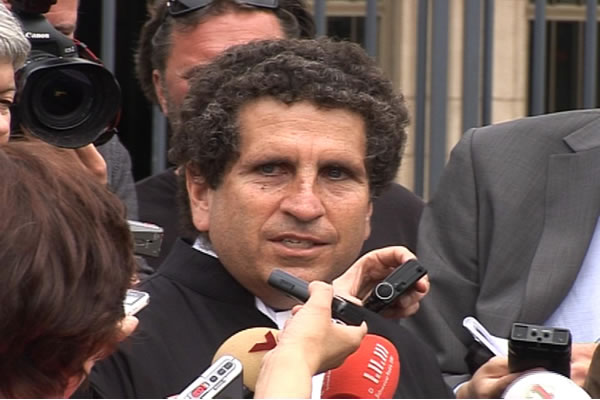Home
KARADZIC’S MOTION ON THE ‘HOLBROOK AGREEMENT’
At an impromptu press conference, Karadzic’s legal adviser Peter Robinson has told the reporters he has just filed the motion challenging the Tribunal’s jurisdiction and calling for an evidentiary hearing where the court would hear evidence on the promises of immunity Karadzic received in return for withdrawing from politics and public life
 Peter Robinson, pravni savetnik Radovana Karadžića
Peter Robinson, pravni savetnik Radovana Karadžića Conveying to the reporters ‘Mr. Karadzic’s regrets that he is unable to address them in person’, his legal adviser Peter Robinson held an impromptu press conference at the lawn in front of the UCTY building. He told the press he had just filed the motion challenging the Tribunal’s jurisdiction on the basis of an agreement reached with Richard Holbrooke in the night of 18 July 1996. In the agreement, Karadzic undertook to withdraw from all state and political functions and from public life, in exchange for Holbrooke’s guarantees he would not be arrested and surrendered to the Tribunal.
The motion, which has 140 pages, contains some thirty annexes with proof, as Robinson contends, of Karadzic’s claims about the immunity he had been promised. Included are the statements of two participants in the talks, Momcilo Krajisnik and Aleksa Buha, who claim they ‘understood’ Holbrooke to be a representative of ‘the international community’ at the talks. They also say the agreement reached on that occasion ‘led them to believe’ not only that Karadzic would not face prosecution, but that the Tribunal would ‘disappear’ after the BH elections in September 1996.
The annexes contain the statements of three US diplomats who accompanied Holbrooke at the time. They claim that there was no mention of the Tribunal or Karadzic’s immunity at the talks. They do not know who, if anyone, kept notes at the meeting. At any rate, as Robinson said today, the defense has been unable to get any paper trail from that meeting, apart from the final agreement, whereby Karadzic undertakes to do everything (withdraw from public life and office), and Holbrooke doesn’t undertake to do anything.
Speaking about the legal aspects of the case, Robinson questioned a conclusion from a previous Trial Chamber decision that fundamental tenets of international law rule out the possibility of immunity for genocide or crimes against humanity. Noting that the Tribunal itself dropped the genocide charge for some of the accused who had made plea agreements with the prosecution, and agreed to cooperate, Robinson described the Karadzic-Holbrooke agreement as ‘an agreement on cooperation’ which makes it possible for the charges to be dropped. Robinson contested a previous conclusion of the Chamber that any such agreement, even if its existence be proven, is not binding on the Tribunal and its Office of the Prosecutor, saying that Holbrooke negotiated with the authority of the Security Council’, which founded the Tribunal. Its decisions therefore have the force of law for the judges and prosecutors in The Hague.
In the motion, Karadzic demands that the Trial Chamber schedule an evidentiary hearing where the court would call evidence and hear witnesses, primarily the participants in the talks on 18 and 19 July 1996: Momcilo Krajisnik and Aleksa Buha and the US negotiating team, including Holbrooke himself, if he agrees to come to The Hague.
Linked Reports
- Case : Karadzic
- 2009-05-08 KARADZIC PAYS THE PRICE FOR HIS CHOICE
- 2009-05-06 CLEARING UP THE GROUND FOR KARADZIC TRIAL
- 2009-05-04 KARADZIC WANTS TO DISQUALIFY FRENCH JUDGE
- 2009-05-26 HOLBROOK’S ‘DIPLOMATIC SLEIGHT-OF-HAND’
- 2009-05-27 ALL THE PRESIDENT'S MEN
- 2009-06-03 KARADZIC WONDERS WHY HE HAS BEEN INDICTED DESPITE SO MUCH EXCULPATORY EVIDENCE
